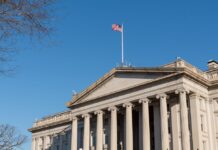The two lawmakers also said they were exhibiting no symptoms of respiratory illness, raising questions of why they were tested at all.
The Centers for Disease Control and Prevention recommends that health-care providers prioritize tests for hospitalized patients who are exhibiting coronavirus symptoms, elderly and medically fragile individuals, along with others who have shown signs of illness after contact with a known or suspected coronavirus patient.
Gaetz, 37, and Meadows, 60, are not known to belong to any groups at high risk for infection. Spokesmen for the two lawmakers declined to comment beyond their public statements confirming the negative test results and their decision to self-quarantine as a precaution.
The scarcity of testing has emerged as a crucial challenge to the U.S. response to the coronavirus outbreak, with health providers, public officials and individuals all calling for more widespread testing capacity. The unavailability of tests makes it difficult to determine how many Americans are infected with the disease.
Accounts from sick Americans who have struggled to secure testing have proliferated on social media, and one Republican pressed the CDC director Tuesday on why fellow lawmakers were able to get quickly tested when her own constituents were waiting days for results.
“I find it interesting that when my colleagues were in contact with someone who later tested positive (they) were able to get tested almost immediately and quickly receive their results while folks in my district and across Washington state are unable to get their testing results back,” Rep. Jaime Herrera Beutler (R-Wash.) told Robert Redfield of the CDC at a House Appropriations Committee hearing.
Redfield acknowledged the shortcomings in testing: “The truth is, we’re underinvested in the public health labs,” he said. “There’s not enough equipment. There’s not enough people. There’s not enough internal capacity. There’s no surge capacity.”
The precise circumstances of the lawmakers’ testing remained sketchy Tuesday.
Gaetz said in an interview Monday that he planned to seek testing at Walter Reed National Military Medical Center later that day, and a person familiar with Meadows’s test said it, too, was conducted at Walter Reed — an institution that is affiliated with both the White House physician’s office and the congressional attending physician and often treats members of Congress.
But there were clues of White House involvement in the testing: Four other lawmakers who consulted with the congressional physician, Dr. Brian P. Monahan, after exposure to confirmed coronavirus carriers — Reps. Julia Brownley (D-Calif.), Douglas A. Collins (R-Ga.), and Paul A. Gosar (R-Ariz.), as well as Sen. Ted Cruz (R-Tex.) — were not told to seek testing, according to their aides.
“This is based on the CDC’s recommendation to not get tested unless symptoms are present,” said Gosar spokesman Ben Goldey. He said Gosar and aides remain healthy.
Gaetz told the Pensacola News-Journal on Tuesday that he was awaiting the results of his test from the White House physician’s office. About an hour after the article published on the newspaper’s website, Gaetz tweeted that the test was negative.
The congressman, who left Washington on Monday afternoon by private vehicle, told the newspaper that he slept in a “Walmart parking lot somewhere off 85” because he couldn’t stay in a hotel.
A White House spokesman, Judd Deere, did not respond to a request for comment, nor did Monahan.
Both Meadows and Gaetz directly interacted with Trump in the days after they visited CPAC and met with the confirmed coronavirus carrier — Gaetz rode on Air Force One with Trump on Monday, and Meadows attended a White House meeting on immigration legislation last week.
Asked why he has not been tested, Trump told reporters Tuesday that the White House doctor, Sean Conley, “sees no reason to do it — there’s no symptoms, no anything.”
“I don’t think it’s a big deal. I would do it,” he said, adding “it’s not a big deal to get tested.”
According to the CDC, about 8,500 people have been tested in the U.S. as of Monday, including those tested by CDC and public health laboratories across the country.
Federal officials have said that tests to cover 75,000 people have been sent out to those public health laboratories, and more than 1 million tests have been sent out to other labs, such as hospitals. But the agency does not currently have a way to track people who receive tests outside that limited network, for example at hospital labs or others that buy test kits that have just become available in the last few days.
U.S. officials have cautioned against comparisons to testing capacity in other countries, but as of March 10, South Korea reported it had tested more than 200,000 people.
“We still need to get more labs in the game and more capacity to run patient samples,” said Scott Gottlieb, former Food and Drug Administration commissioner in the Trump administration. “And the testing capacity we do have isn’t evenly distributed to the parts of the country where there may be the greatest medical need.”
Multiple lawmakers in both parties, including House Speaker Nancy Pelosi (D-Calif.), said they did not think members of Congress ought to receive special access to tests not available to the public at large or be subject to a higher standard for screening.
“I think we have to take care of the people first,” Pelosi said Tuesday.
Rep. Raul Ruiz (D-Calif.), a physician, said lawmakers should get the same treatment as the general public, following the recommendations of public health authorities:
“A member who meets the clinical justifications for getting a test should get tested. And if they don’t necessarily meet the justification to get tested . . . then they should not be tested because they are members of Congress.”
The CDC’s guidance, however, tells health-care providers to “use their judgment” to evaluate a patient and decide whether testing is warranted. Besides judging possible symptoms, clinicians are being told to consider “epidemiologic factors” as well.
“Documented COVID-19 infections in a jurisdiction and known community transmission may contribute to an epidemiologic risk assessment to inform testing decisions,” the CDC said in guidance issued Sunday, referring to the medical community’s name for the pathogen.
One senior lawmaker, meanwhile, suggested Monday that a higher standard of care may be warranted for members of Congress, who could be called upon in the coming weeks to pass legislation to address the outbreak and its economic effects.
“Look, we want to have all Americans have tests,” House Majority Leader Steny H. Hoyer (D-Md.). “But we also want to make sure that the Congress can respond to this crisis so we can protect all Americans.”
Josh Dawsey, Laurie McGinley and Ben Terris contributed to this report.








